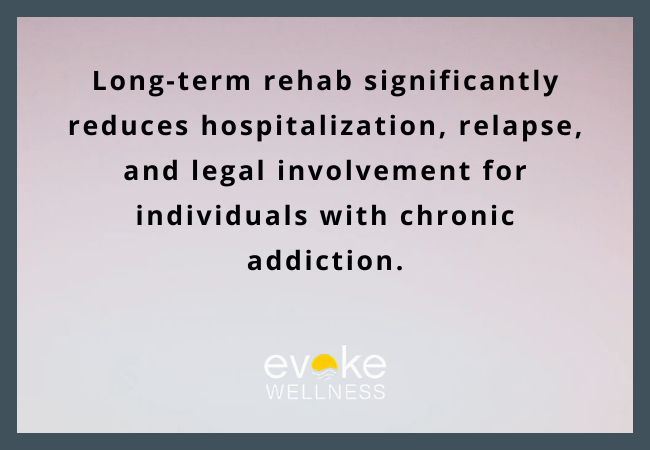Addiction is rarely a surface-level issue. For many individuals, substance use is deeply rooted in trauma, co-occurring mental health disorders, environmental stressors, and long-standing behavioral patterns. While short-term rehab may be helpful in some cases, long-term residential rehab provides the kind of sustained, immersive care necessary for profound transformation. At Evoke Wellness at Cohasset, our long-term treatment model is grounded in evidence-based practices, clinical expertise, and compassion-driven care designed to heal the whole person—not just their addiction.
But who truly benefits from long-term care, and how exactly does it work? Understanding the purpose, structure, and outcomes of this type of treatment can help individuals and families make informed decisions about their recovery journey.
Understanding Long-Term Residential Rehab
Long-term residential rehab is a form of addiction treatment that involves living full-time at a treatment facility for an extended period, usually ranging from 60 to 90 days or longer. Unlike outpatient or short-term programs, long-term rehab offers intensive therapy, peer support, and structured daily routines in a substance-free, supervised environment.
This level of care is designed for individuals who require more time to address the underlying causes of their addiction. It allows for deeper emotional healing, more robust skill-building, and a gradual transition into independence—factors that are critical for sustained sobriety.
For many individuals, addiction isn’t simply about the substances they’ve used. It’s about the life circumstances, trauma, mental health challenges, and learned behaviors that fueled their substance use. A short-term treatment program may not be enough to fully address these complex issues. Long-term rehab, on the other hand, offers the time and space needed to dig deeper, heal emotionally, and re-establish the foundation for a healthy life.
Who Needs Long-Term Residential Rehab?
While everyone’s journey is different, long-term residential rehab is especially beneficial for individuals who:
1. Have a History of Chronic Relapse
If you’ve completed short-term rehab programs or outpatient treatment multiple times but continue to relapse, a longer stay may provide the time and support needed to finally break the cycle.
2. Struggle with Severe or Long-Standing Addiction
People who have used substances for many years often experience both physical dependency and deeply ingrained behavioral patterns. Long-term treatment allows for:
-
Full detox and stabilization
-
Cognitive and emotional retraining
-
Comprehensive relapse prevention planning
3. Have Co-Occurring Mental Health Disorders
Many individuals in need of long-term care also have dual diagnoses, such as:
-
Depression
-
Anxiety disorders
-
PTSD
-
Bipolar disorder
-
Personality disorders
Dual diagnosis treatment in a long-term setting ensures that both the addiction and the mental health condition are addressed simultaneously, improving recovery outcomes.
4. Experienced Significant Trauma
Trauma survivors may require more time to feel safe, regulated, and ready to process their experiences. Our trauma-informed care model prioritizes emotional safety and integrates therapies like:
-
EMDR (Eye Movement Desensitization and Reprocessing)
-
Somatic therapies
-
Mindfulness-based stress reduction
5. Lack a Stable or Supportive Home Environment
Without safe housing, a stable routine, or supportive relationships, early recovery becomes much harder. Long-term residential rehab removes individuals from high-risk environments and helps them establish healthier patterns before reintegrating into daily life.
In these situations, a Residential Treatment Program in Massachusetts like the one offered at Evoke Wellness at Cohasset can provide the environment and structure necessary for meaningful, lasting change.
The Core Components of Long-Term Residential Rehab
Long-term rehab goes beyond detox and abstinence. It provides a full continuum of care, with multiple therapeutic modalities and recovery strategies. Here’s a breakdown of what clients can typically expect:
Comprehensive Clinical Assessment
Upon entry, clients undergo a thorough evaluation to assess physical health, psychiatric status, substance use history, and psychosocial needs. This process is essential for developing a personalized treatment plan that guides the course of care.
For individuals struggling with both substance use and mental health issues, Dual Diagnosis Treatment in Massachusetts ensures that both conditions are addressed in tandem to improve overall outcomes.
Medical Stabilization and Detox
Many individuals entering long-term rehab first require safe withdrawal from substances. Medical Detox Programs in Massachusetts provide 24/7 medical supervision and symptom management during this critical phase. Once stabilized, clients can fully engage in the therapeutic aspects of treatment.
Individualized Therapy
At the heart of long-term treatment is one-on-one therapy. Clients meet regularly with licensed clinicians to explore trauma, identify triggers, and develop coping strategies. These sessions help build insight, emotional regulation, and resilience.
When clients are also dealing with mood disorders, anxiety, or trauma, our program’s role as a Mental Health Treatment Center in Massachusetts becomes essential. Addressing mental health alongside addiction is key to long-term recovery.
Group Therapy and Peer Support
Recovery is not a solo journey. Group therapy sessions offer a safe space for clients to connect, share experiences, and hold each other accountable. These sessions foster empathy, build community, and reinforce healthy interpersonal dynamics.
In addition to group settings, clients benefit from recreational therapy, relapse prevention workshops, and educational sessions focused on life skills, nutrition, and wellness.
Routine and Responsibility
Structure is crucial in the early stages of recovery. A typical day in long-term rehab includes set meal times, therapy sessions, recreational activities, and designated personal time. These routines provide a sense of stability and predictability, which helps ease anxiety and improve self-discipline.
This consistency is especially beneficial for clients in an Intensive Inpatient Program in Massachusetts, where the focus is not only on recovery but on rebuilding every facet of life disrupted by addiction.
Family Engagement
Addiction impacts more than just the individual—it touches families and loved ones in deep and lasting ways. Family therapy and visitation opportunities help rebuild trust, improve communication, and teach families how to support recovery without enabling.
The Transition from Inpatient to Outpatient Care
Recovery doesn’t end when someone leaves residential rehab—it evolves. As clients progress in treatment, they begin to prepare for reintegration into their everyday lives. This may involve transitioning to step-down programs, such as an Outpatient Program in Massachusetts, where they can continue receiving therapeutic support while gradually resuming their responsibilities.
Discharge planning is comprehensive and collaborative. It includes identifying community resources, establishing relapse prevention strategies, and securing ongoing mental health care. Continued engagement through alumni programs, therapy, and sober living arrangements helps ensure clients stay connected and supported beyond their initial treatment phase.
Why Choose Evoke Wellness?
At Evoke Wellness at Cohasset, our long-term rehab program isn’t just about treating addiction—it’s about transforming lives. As a premier Addiction Treatment Center in Massachusetts, we combine medical excellence, therapeutic innovation, and compassionate care to meet each client where they are and guide them to where they want to be.
Our residential model provides a safe, structured space for deep healing. We offer evidence-based therapies, dual diagnosis treatment, and personalized care plans designed to address the physical, emotional, and psychological aspects of addiction. Clients receive 24/7 support from a highly trained team committed to their recovery.
What sets us apart is our holistic approach—one that integrates mind, body, and spirit. With serene surroundings, wellness activities, and a strong focus on community, we help clients rediscover themselves, rebuild their confidence, and reclaim their futures.
Long-Term Rehab: A Holistic Approach to Healing
At Evoke Wellness, we recognize that addiction is not just about physical dependency but also about emotional and psychological challenges. As such, our long-term residential treatment incorporates holistic practices to address the mind, body, and spirit. This means our clients have access to:
-
Wellness Activities: These activities, such as yoga, meditation, and mindfulness exercises, help clients reconnect with their bodies and find balance in their lives. Physical wellness plays a crucial role in mental health and recovery.
-
Nutritional Support: A healthy body fosters a healthy mind, which is why nutrition plays a pivotal role in our treatment approach. Clients receive guidance on how to nourish their bodies and make healthy choices that support their long-term wellness.
-
Therapeutic Activities: From art therapy to fitness programs, our team encourages clients to explore creative outlets, physical activities, and hobbies that promote healing and self-discovery.
-
Rebuilding Relationships: Whether it’s through family therapy or group therapy, our goal is to help clients rebuild the relationships that addiction may have fractured. This sense of community is essential for lasting recovery.
Conclusion
Long-term residential rehab is not just an extended stay—it’s a lifeline for those who need more than a quick fix. It offers time, space, and support for real healing to take root. For individuals with chronic relapse, co-occurring disorders, or deeply embedded trauma, this level of care provides a second chance at life and freedom.
At Evoke Wellness at Cohasset, we are proud to offer a recovery path that empowers individuals to build lasting change, reconnect with their purpose, and thrive beyond addiction. Whether you’re seeking your first step toward sobriety or continuing the journey after previous attempts, we’re here to help you every step of the way. Call us today at 866.931.6429 to learn more about our Addiction Treatment Center in Massachusetts and discover if long-term residential care is right for you.
Frequently Asked Questions (FAQs)
What is long-term residential rehab?
Long-term residential rehab is an intensive addiction treatment program where clients live at the facility for an extended period, typically ranging from 60 to 90 days. This type of treatment allows for deeper, more sustained recovery through comprehensive therapy, structured routines, and supportive care.
Who benefits from long-term rehab?
Long-term rehab is particularly beneficial for individuals who have struggled with chronic addiction, experienced multiple relapses, have co-occurring mental health conditions, or lack a supportive home environment. It’s also ideal for those addicted to highly addictive substances.
How is long-term residential rehab different from short-term programs?
While short-term rehab may last anywhere from 28 to 30 days, long-term residential rehab offers a more immersive and extended treatment experience. This allows for in-depth therapy, better addressing underlying issues like trauma and mental health disorders, which are often contributors to addiction.
What types of therapy are used in long-term rehab?
Long-term rehab programs typically include a mix of individual therapy, group therapy, family therapy, and specialized therapies like cognitive-behavioral therapy (CBT), dialectical behavior therapy (DBT), and trauma-focused care. These approaches help individuals address both the psychological and emotional aspects of their addiction.
What should I expect during a day in long-term residential rehab?
A typical day includes structured activities such as therapy sessions, group discussions, wellness activities, personal time, and healthy meals. Clients follow a consistent schedule, which helps build discipline and stability during recovery.
How do I transition from residential rehab to outpatient care?
After completing a long-term rehab program, individuals typically transition to an outpatient program or aftercare services. This helps them maintain progress, continue therapy, and integrate into everyday life with ongoing support, including alumni groups and sober living arrangements.





